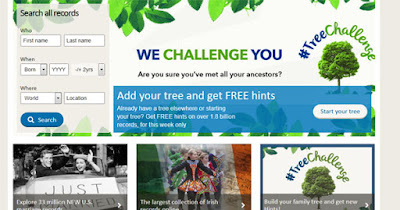Saturday,
October 22, 2016
is DNA Day
at DCU Center
at DCU Center
in Worcester, Massachusetts
Everything
You Need to Know
about Genetic Testing
for Genealogy
for Genealogy
to Be Presented in a Seminar
by American Ancestors (NEHGS) in Partnership with AncestryDNA
by American Ancestors (NEHGS) in Partnership with AncestryDNA
Bill
Griffeth, Author of Best-Selling The Stranger in My Genes,
to Deliver Keynote Address and Appear at Luncheon Forum
to Deliver Keynote Address and Appear at Luncheon Forum
September 27, 2016—Boston, Massachusetts--DNA
tests can break down genealogical brick walls, connect distant cousins, unlock
mysteries, and even reveal long kept family secrets. But accurately deciphering
results is not without its challenges. Experts from American Ancestors of the
New England Historic Genealogical Society (NEHGS) and AncestryDNA will present
a full-day seminar on how to interpret DNA findings and apply that knowledge to
your own family history research at a DNA Day on Saturday, October 22, 2016, at
the DCU Center in Worcester, Massachusetts. In a keynote address marking his
first public appearance since the publication of the best-selling book The
Stranger in My Genes, author Bill Griffeth, co-anchor of Closing Bell
on CNBC, will discuss how his own genetic findings altered his sense of
identity and his family tree.
Beyond lectures, participants will have the opportunity to chat
with genealogists and DNA experts, acquire select publications, purchase a DNA
kit from AncestryDNA, attend website demonstrations, take advantage of special
discounts, and interact with other family historians. The author Bill Griffeth
will be available to sign copies of The Stranger in My Genes and will
participate in a luncheon forum on the story behind his new book.
Program Agenda
9:00 AM Registration and check-in opens at DCU Center
9:30 AM Opening remarks
9:40 AM Keynote address: Bill Griffeth, author of The
Stranger in My Genes
10:15 AM Lecture: The Possibilities of Genetic Testing,
Christopher C. Child (NEHGS)
11:15 AM Lecture: DNA Testing: From Start to Finish, Anna
Swayne (AncestryDNA)
12:15 PM Lunch; separate registration for lunch with
author Bill Griffeth
1:30 PM Lecture: Using Genetic Evidence in your
Family Tree, Anna Swayne (AncestryDNA)
2:30 PM Break; Book signing by author for The
Stranger in My Genes
3:00 PM Lecture: Sharing Your Results, Christopher
C. Child (NEHGS)
4:00 PM Prize drawing
SPEAKER BIOS
Christopher C. Child, Senior Researcher of Newbury
Street Press at New England Historic Genealogical Society, is the editor of the
Genetics and Genealogy column in American Ancestors magazine and editor
of the Mayflower Descendant. He has written several articles for a
number of scholarly journals and is the co-editor of The Ancestry of Catherine
Middleton, co-author of The Descendants of Judge John Lowell of Newburyport,
Massachusetts, and author of The Nelson Family of Rowley, Massachusetts.
His areas of expertise include southern New England, especially Connecticut;
New York; ancestry of notable figures, especially presidents; genetics and
genealogy; African-American and Native-American genealogy, 19th and 20th
Century research, westward migrations out of New England, and applying to
hereditary societies.
Bill Griffeth, author of The Stranger in
My Genes, is one of the country's longest serving and most respected
financial journalists on TV. He began covering Wall Street in 1981 on the
Financial News Network (FNN). In 1991 he joined CNBC where he has anchored a
number of programs, most recently Closing Bell from the New York Stock
Exchange. Since 2003, his hobby has been genealogy, and he has traveled tens of
thousands of miles in the U.S. and Europe researching his and his wife's family
histories. He currently serves as a Trustee of the New England Historic
Genealogical Society in Boston.
Anna Swayne of AncestryDNA has ten years of experience
in the DNA Genealogy world. Her focus is educating on the power of DNA and the
story it can unlock for each of us. She enjoys teaching beginner and
intermediate classes at national and local conferences on DNA and how it can
answer ancestral questions or assist with genealogical roadblocks.
Registration and information:
www.AmericanAncestors.org or call 617-226-1226
Date and time:
Saturday, October 22, 2016
9:00 AM – 4:00 PM
Saturday, October 22, 2016
9:00 AM – 4:00 PM
Location:
The DCU Center
50 Foster Street
Worcester, Mass. 01608
The DCU Center
50 Foster Street
Worcester, Mass. 01608






